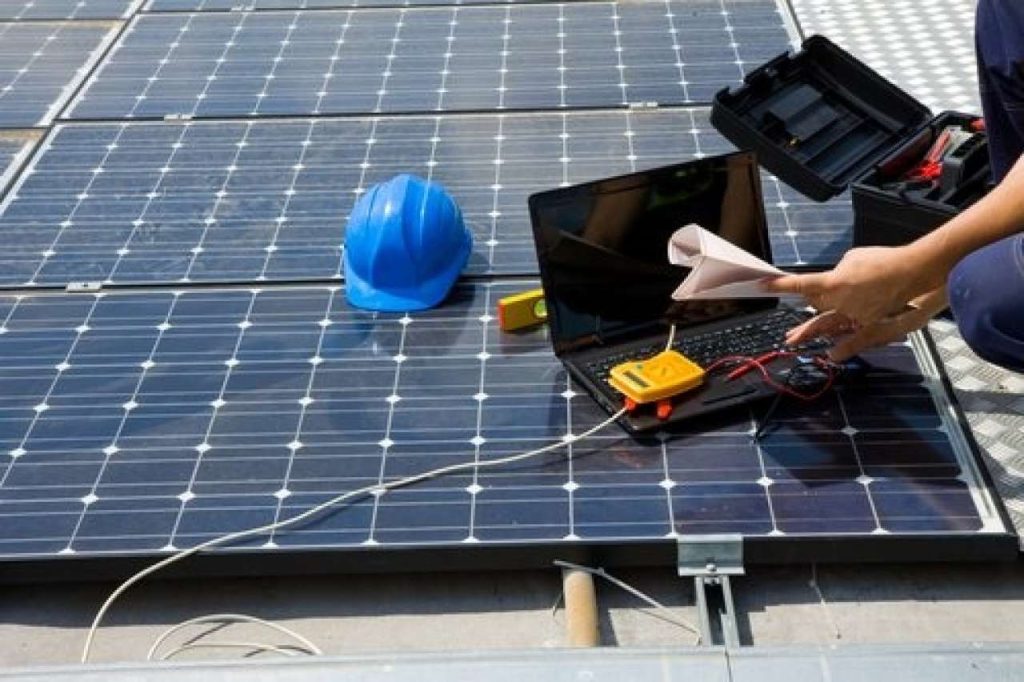To maintain your solar panels over the years, make sure you clean them regularly for peak efficiency. Keep an eye on performance, check for wear, maintain inverters, trim trees, and inspect for damage caused by weather elements. Following these tasks helps maximize the lifespan and output of your solar energy system.
Regular Cleaning
To guarantee peak efficiency, regularly clean your solar panels to remove dirt and debris that can hinder their performance. Cleaning frequency is important to make sure your panels operate at their best. Ideally, you should clean them at least twice a year, but more frequent cleaning may be necessary if you live in a dusty or polluted area. For those seeking professional maintenance, solar panel installers Glasgow can provide expert advice and services to keep your panels in top condition.
Dirt accumulation can greatly impact the efficiency of your solar panels. When dirt builds up on the surface of the panels, it can block sunlight from reaching the photovoltaic cells, reducing their ability to generate electricity. This reduction in sunlight absorption can lead to a decrease in overall energy production, ultimately affecting the output of your solar system.
When cleaning your solar panels, it’s essential to use optimal methods to avoid damaging the equipment. Start by gently rinsing the panels with water to remove loose dirt. Then, use a soft brush or sponge with a mild detergent to scrub away any stubborn grime. Avoid abrasive materials that could scratch the surface of the panels.
Regular maintenance like this will ensure your solar panels continue to perform efficiently for years to come.

Performance Monitoring
You must regularly conduct performance checks on your solar panels to make sure they’re operating at peak levels.
Analyzing data collected from these checks allows you to make necessary adjustments for system optimization.
Evaluating the efficiency of your solar panel system is essential for maximizing energy output and overall performance.
Regular Performance Checks
Consistently monitoring the performance of your solar panels is essential to guarantee peak efficiency and output. Regular performance checks help make sure that your system is producing the expected amount of energy.
By keeping an eye on energy production levels, you can quickly identify any dips or inconsistencies in performance that may indicate underlying issues such as panel degradation.
To conduct effective performance checks, start by reviewing your energy production data regularly. Compare the actual output of your solar panels to the expected output based on factors like weather conditions and sunlight exposure. Any significant deviations should prompt a closer inspection to determine the cause, which could be related to panel degradation or other system malfunctions.
In addition to monitoring energy production, keep track of the overall health of your solar panels. Look for signs of wear and tear, such as physical damage or discoloration, which could indicate panel degradation. Addressing these issues promptly can help maintain the longevity and efficiency of your solar panel system.
Data Analysis for Optimization
Effective data analysis is vital for optimizing the performance of your solar panels. By staying informed about data analysis trends and implementing optimization strategies, you can guarantee that your solar panel system operates at its peak efficiency.
Regularly analyzing data related to solar panel efficiency and output can help you identify any issues promptly and take necessary actions to maintain peak performance.
To make the most out of your solar panels, it’s important to monitor and assessthe data generated by your system consistently. By doing so, you can spot any anomalies or deviations from the expected performance, allowing you to address them promptly. This proactive approach won’t only maximize your system’s efficiency but also help you save on maintenance costs in the long run.
Incorporating data analysis best practices into your routine maintenance can greatly enhance the overall performance and longevity of your solar panel system. Stay updated on the latest trends in data analysis and optimization techniques to ensure that your solar panels operate efficiently and effectively for years to come.
System Efficiency Assessment
Monitoring the efficiency of your solar panel system through performance trackingis essential for ensuring peak operation. By regularly evaluating the energy output of your solar panels, you can identify any dips in performance and address them promptly to maximize your system’s efficiency.
Tracking the energy production over time allows you to spot trends and patterns, helping you make informed decisions regarding maintenance or upgrades.
Another critical aspect of system efficiency evaluation is monitoring the panel orientation. Ensuring that your panels are correctly positioned towards the sun is vital for optimizing energy generation. If panels aren’t facing the right direction or are obstructed by shading from nearby objects, their efficiency can be significantly diminished.
Regularly checking and adjusting the panel orientation can help you maintain high performance levels.
Inspection for Wear
Consistently checking your solar panels for signs of wear is crucial to guarantee their peak performance and longevity. Over their lifespan, solar panels may exhibit wear patterns that could impact their efficiency. By inspecting your panels regularly, you can catch any issues early and prevent them from escalating.
One common wear pattern to look out for is potential cracking or delamination on the surface of the panels. These issues can arise due to exposure to harsh weather conditions or poor installation. If left unattended, they can lead to decreased energy production and even damage to the panels themselves.
Additionally, keep an eye out for discoloration or hot spots, as these may indicate internal damage. Inspect the frames and mounts for any signs of rust or corrosion, particularly in areas with high humidity or salty air. Such wear can compromise the structural integrity of the panels and pose safety risks.
Inverter Maintenance
Regular maintenance of your solar panels also involves confirming the proper functioning of your inverters. Inverter maintenance is vital to the overall performance of your solar panel system. Periodically checking your inverters for any issues and conducting inverter troubleshooting can help prevent potential problems that may lead to system downtime.
When it comes to inverter maintenance, it’s important to stay proactive. Regularly inspecting your inverters can help detect any issues early on, reducing the risk of system downtime. In case of any malfunctions, prompt inverter troubleshooting is necessary to address the problem swiftly and efficiently.
Moreover, considering inverter upgrades when necessary can enhance the efficiency of your solar panel system. While these upgrades may entail some maintenance costs initially, they can lead to long-term benefits such as increased energy production and improved system performance.



